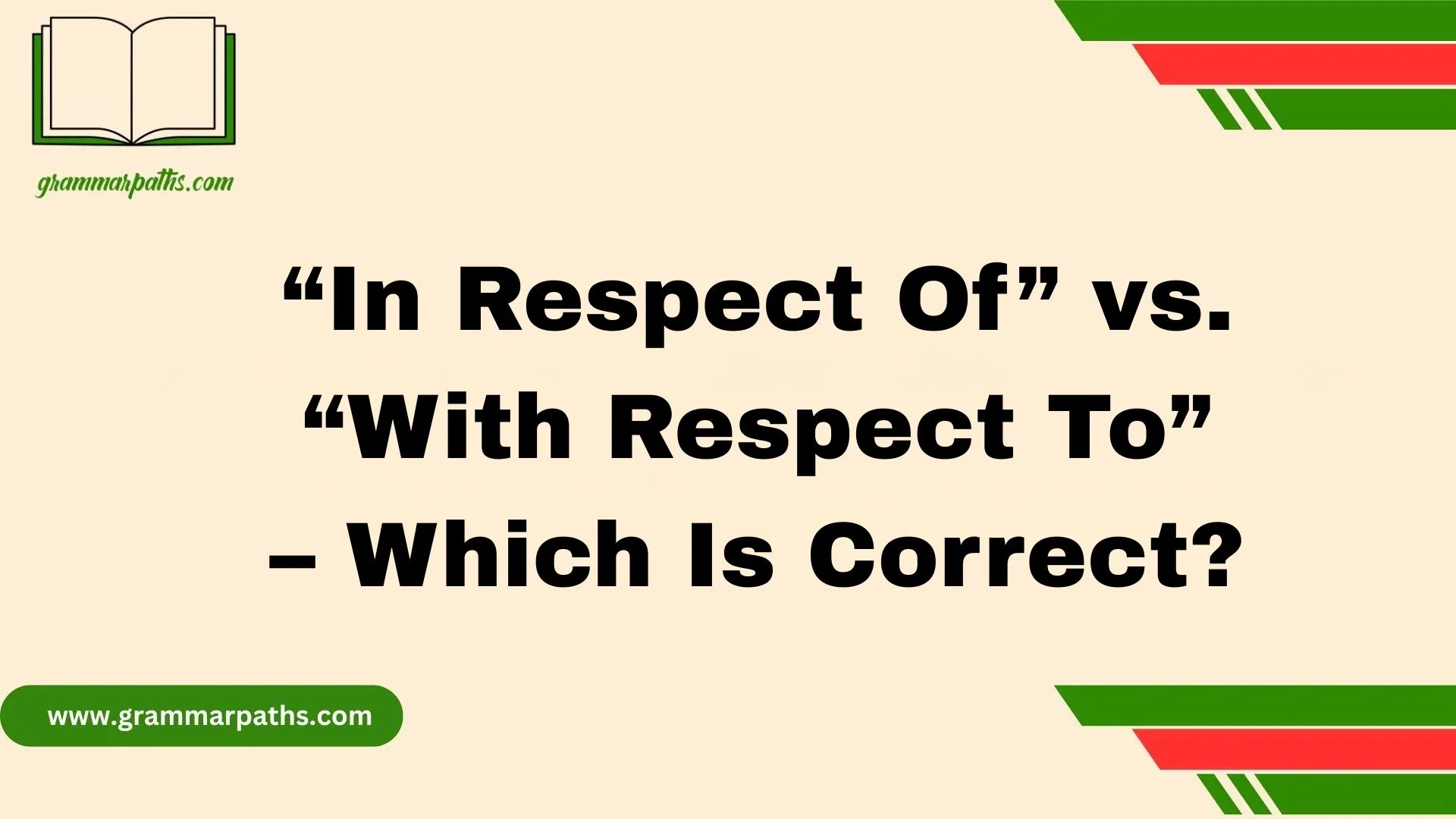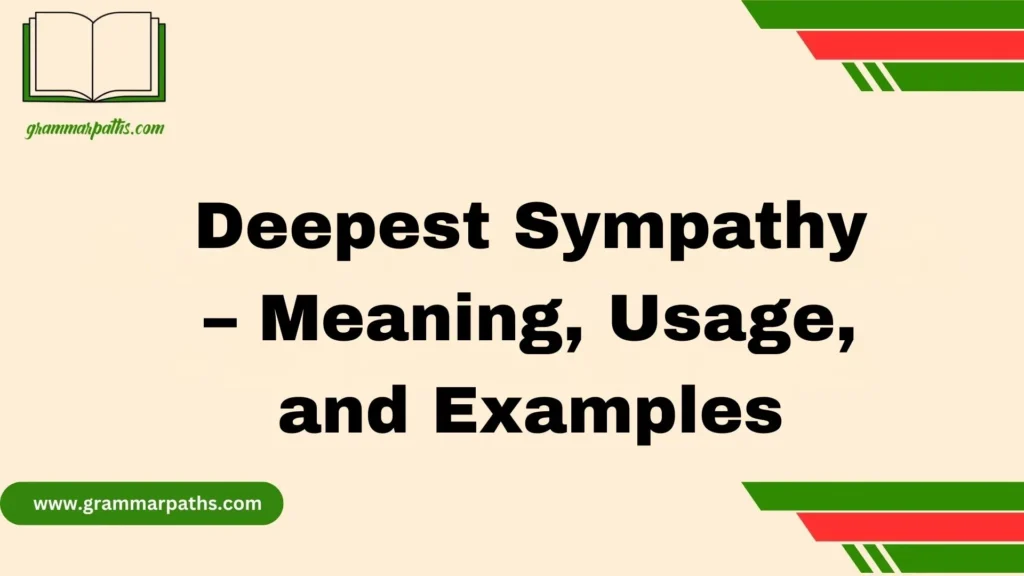Understanding the English language can feel like navigating a maze, especially when it comes to formal phrases like “In Respect Of” and “With Respect To.” These sayings and idioms carry a universal appeal, yet their proper usage often confuses both native speakers and learners. Over time, the phrase has evolved into a reliable tool to express clarity, insight, and understanding in complex topics. From my career as a writer and editor, I’ve found that explaining such tricky concepts with real-life examples helps solve the mystery behind them.
Using these phrases with precision adds powerful depth to your communication, making dense material easier to clarify and illuminate for readers. The expression cuts through confusion, and its vivid imagery can gracefully guide the audience’s thought, even in heavy or dark corners of a complex topic.
To shed some light on these phrases, it helps to imagine a flashlight shining on the literal and metaphorical roots of the expression. Referring to its actual meaning, you can decode the phrase in both modern and traditional usage, showing why it has remained relevant and useful across situations that call for clarity or revelation.
By picking synonyms, diving into examples, and embracing a practical approach, you can explore the angle, emotional weight, and purpose of these phrases. This short guide not only delivers a clear meaning, but also helps elevate your vocabulary, speak with intention, and confidently navigate English communication.
Understanding the Phrases
“With Respect To” – Meaning and Usage
“With respect to” is widely used in modern American English as a formal way of saying “about” or “regarding.” It is clear, direct, and suitable for professional or academic writing.
Examples in sentences:
- With respect to the quarterly report, all departments must submit data by Friday.
- The professor explained her views with respect to climate change policies.
This phrase works well in both spoken and written English, particularly in corporate, academic, and legal contexts. Its popularity in American English comes from its clarity and simplicity, which avoids ambiguity.
“In Respect Of” – Meaning and Usage
“In respect of” is more commonly found in British English, especially in legal, governmental, and formal documentation. It carries a meaning similar to “regarding” but has a more traditional and formal tone.
Examples in sentences:
- In respect of the new regulations, all contractors must submit compliance reports.
- The letter addressed concerns in respect of the company’s environmental policies.
Although it is grammatically correct, using it in American English can sound archaic or overly formal, and it is rarely used in casual or business writing in the U.S.
Comparing American and British English
Key Differences in Formality and Style
| Phrase | Common Usage | Tone | Region |
| With respect to | Business, academia | Clear, professional | US & international |
| In respect of | Legal, government | Formal, traditional | UK & Commonwealth |
Americans prefer “with respect to” because it is more direct and easily understood. Britons, however, retain “in respect of” in formal contexts, particularly in legal or bureaucratic language. The distinction is subtle but important for maintaining professionalism and tone.
Practical Implications
Choosing the wrong phrase can confuse readers. For instance, using “in respect of” in an American corporate email may seem overly stiff or outdated. Conversely, using “with respect to” in a formal British legal document may be viewed as too casual. Awareness of your audience and purpose ensures precision and clarity.
Grammar and Prepositional Accuracy
Prepositions are small words with a big impact on meaning. Misusing them can change the tone, clarity, or even the legal interpretation of a sentence. Both “with respect to” and “in respect of” function as prepositional phrases, linking statements to a subject or topic.
Key points to remember:
- These phrases introduce the topic of discussion.
- They are followed by a noun or noun phrase.
- Avoid redundancy: “Regarding with respect to” is incorrect.
- Context matters: Formal documents may favor one over the other depending on jurisdiction.
Common Mistakes to Avoid
Even professional writers sometimes misuse these expressions. The most frequent errors include:
- Interchanging phrases indiscriminately: Treating them as completely interchangeable without considering audience and context.
- Overcomplicating sentences: Adding unnecessary words that obscure the message.
- Misplacing prepositional phrases: Incorrect placement can confuse the reader.
Incorrect: The report in respect of was reviewed by the committee.
Correct: The report in respect of company policies was reviewed by the committee.
Enhancing Your Formal English
Expert Tips
- Know your audience: American readers usually prefer “with respect to,” while British readers may accept “in respect of” in formal or legal writing.
- Check context: For emails, reports, or essays, clarity is more important than tradition.
- Simplify sentences: Avoid unnecessary words or phrases; stick to concise and professional constructions.
Tools and Resources
- Grammar checkers: Grammarly, ProWritingAid.
- Style guides: Chicago Manual of Style, Oxford English Dictionary.
- Corpora: COCA (Corpus of Contemporary American English) for examples in usage.
Global Communication Considerations
English is the lingua franca of international business. Variations like “in respect of” vs. “with respect to” can affect clarity across borders. Consider these guidelines:
- International emails: Prefer “with respect to” for clarity.
- Legal documents: Always use the regionally accepted phrase.
- Academic papers: Follow the style guide of your institution (APA, MLA, etc.) to avoid confusion.
Tip: When in doubt, aim for the phrase that is most universally understood.
Case Studies and Real-Life Examples
Case Study 1: British Legal Document
A UK government report stated:
“In respect of environmental compliance, all factories must submit reports quarterly.”
Here, “in respect of” aligns with traditional British legal language, emphasizing formality and authority.
Case Study 2: American Corporate Memo
An American company issued:
“With respect to the new marketing strategy, all team leads should submit progress updates weekly.”
Using “with respect to” ensures clarity and a professional tone without sounding outdated.
Case Study 3: Academic Research Paper
- With respect to climate change mitigation, our study explores the efficacy of renewable energy policies.
- Avoiding “in respect of” keeps the paper accessible to an international audience.
Quick Reference Table: “In Respect Of” vs. “With Respect To”
| Feature | With Respect To | In Respect Of |
| Meaning | About, regarding | About, concerning |
| Tone | Neutral, professional | Formal, traditional |
| Region Preference | American English | British English |
| Common Contexts | Business, academia | Legal, governmental |
| Modern Usage | High | Moderate/Declining |
| International Clarity | High | Medium |
Conclusion
Understanding the subtle differences between “In Respect Of” and “With Respect To” can significantly improve your English communication. These sayings and idioms are not just colorful phrases; they carry clarity, insight, and purpose in complex topics.
By exploring their origins, literal and metaphorical roots, and modern usage, you can shed some light on their proper application. Applying them with care enhances your writing and speaking, allowing you to express thoughts with intention, depth, and relevance while guiding your readers through dense material.
FAQs
Q1: Are “In Respect Of” and “With Respect To” interchangeable?
Not always. While both are formal, “With Respect To” is more commonly used in modern English, whereas “In Respect Of” can feel dated or more legalistic. Understanding the context is key to proper usage.
Q2: Can these phrases improve clarity in writing?
Yes. Using them correctly illuminates your ideas, clarifies complex concepts, and helps readers follow dense topics with ease.
Q3: Are there practical tips for remembering their correct use?
Imagine a flashlight shining on dense material. Think of “With Respect To” as guiding thought and clarity in modern contexts, and “In Respect Of” as a more formal or legal expression. Examples, synonyms, and real-life usage can help embed them in your vocabulary.
Q4: Does using these phrases affect tone?
Absolutely. They add depth, weight, and formality, making your expression powerful yet graceful.

Grace Marie is the dedicated writer behind GrammarPaths.com, where she shares her passion for English grammar, idioms, and writing mastery. With a strong background in language studies and years of experience helping learners improve their communication skills, Grace creates clear, practical, and engaging content that makes English easy to understand.












